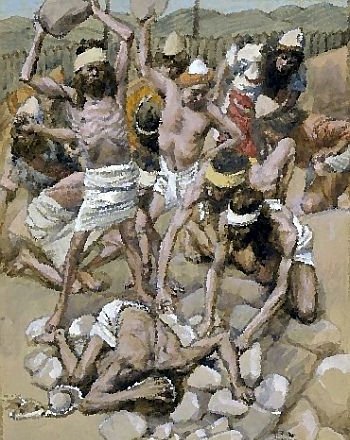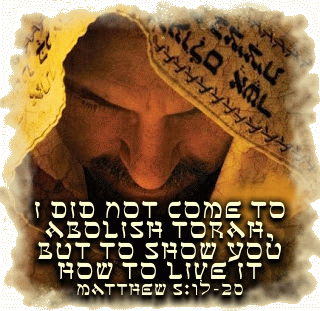
|
| ...Sabbath-Breaker Stoned (Tissot) |
|
by haRold Smith
a citizen of the Commonwealth (Ephesians 2:19) |
After reading the article, Keeping the Sabbath (click on highlighted words to view content), Charlene wrote: "Why was the man caught picking up sticks on Shabbat stoned? Was it because it was a menial task he was doing, or did he maybe sell the sticks as a means of earning his living?"
While the Torah does not say explicitly why this man was stoned for seemingly just picking up sticks, we can make some inferences based on the context of the passage: The second half of Numbers 15 details what to do in cases regarding unintentional sin, which are a category of sins in Hebrew called shegagah or translated as the English "ignorance" found in Numbers 15:24. The shegagah category refers to that which is a mistake, an oversight, or otherwise general accident based on negligence. YHVH still counts the infraction as a sin, but His punishment is not as steep because the person probably meant to do well and simply missed the mark (Numbers 15:27-28). Immediately following the unintentional sins section is a short warning about the opposite end of the sin category spectrum: sins of a high hand (in Hebrew b’yad ramah). Unlike accidental sins, this category describes the wrong intentions and rebellious nature of the person caught sinning. The Hebrew b’yad ramah is literally "of the hand raised up." The imagery is that of a defiant person sinning and shaking their fist in the air in a gesture of "I defy you! I dare you to punish me!" (Numbers 15:31). Notice how the Torah extends forgiveness for the person who sins unintentionally but it does NOT prescribe any remedy for sins done defiantly. If caught, the person can only repent and enter a plea bargain to reduce his sentence to an “unintentional” category hoping to remain in community. Also, notice that high-hand sinning carries a penalty of being "cut off," which is being put outside the camp (exile), but willful desecration of the Sabbath had already been assigned the death penalty earlier in the Torah (Exodus 31:14).
What does this have to do with a man being stoned to death for picking up sticks on the Sabbath? Because as the immediate set of verses following the warning about sins of a high hand, the context tells us this man was probably not simply gathering wood. Perhaps the backstory that is missing from the text is that he was caught and warned quite a few times already about breaking the Sabbath which is supposed to be about rest (Exodus 31:15), yet he repeatedly decided to gather sticks, with no regard for YHVH's Words - defiant in his manner of gathering. Remember that the reason for gathering twice the amount on the sixth day in preparation of the seventh day was a test to see whether the people would remain in YHVH's Presence by keeping His Words or not. Since YHVH is the Source of Life, to not be in His Presence is death. Following the context, this passage ends with instructions for the tassels (zit-zitziot) the purpose of which is to bring to remembrance the Words of YHVH. Either way, YHVH is within His rights to set an example for the rest by removing this (likely defiant) Sabbath violator from the community either by death or by exile. After all, YHVH did the same thing in Acts 5:1-11 when Ananias and Sapphira lied about the money received for their plot of land - also breaking YHVH's Words of Exodus 20:16. YHVH made them into a valuable object lesson for the early Believing Community by striking these two dead. And this is post resurrection! I believe this is what is happening here as well.
|
"On the first day of the week,
when we were gathered together to break bread,
Paul talked with them, intending to depart on the next day, and he prolonged his speech until midnight." Acts 20:7 |
Stephanie also wrote asking, "In Acts 20:7 there is a mention about 'the Lord’s day'. My friend believes that Yeshua was raised up on the 1st day, that he appeared to His Apostles on the first day to worship, break bread etc. My friend is Christian and follows Jesus Christ and I am constantly told that I am living under the law because I keep the Sabbath (7th day) and I keep the Feasts. I am still learning a lot and I just don’t know how to explain all this to my friend. Can you help?"

|
To begin with, there is only one scripture in the entire bible that is translated into the English "the Lord's Day" and it is found in Revelation 1:10. The Greek wording of that verse actually reads: "I had became in unto-a-currenting-to in unto-the-one unto-authority-belonged-of unto-a-day." In the Hebraic world of the Hebrew apostle John, there was no other day the authority of which belonged to anyone other than YHVH - the seventh day Sabbath. Because of the wording in Acts 20:7 that says the early believers met on Sunday, the first day of the week, Christianity has hijacked that wording completely out of the Hebrew context these words were written from to mean that these Hebrew believers in Yeshua as the Hebrew Messiah completely abandoned their Hebraic upbringing. That they met on the first day of the week was only after keeping Shabbat on the seventh day. Acts 2:46-47 says the faithful met together every day to worship and break bread. Neither of these verses says anything about excluding or replacing Shabbat. The same is true for 1Corinthians 16:2. The context surrounding the comment about the first day of the week in this verse is because the Hebrew word for "work" in Exodus 20:9-10 ("...you shall do no work on the Sabbath") comes from the Hebrew word melakah which means "occupation, work, business; the work of an artisan for public consumption". In other words, you don't do on the Sabbath what you would normally do on the other six days to make a living. That includes engaging in any kind of commerce; i.e., the exchange of money or goods "prospered" from that commercial activity.
Those who come under the umbrella of traditional Christianity, regardless of how it is presented, have become blinded to the truth. The definition of the English word "tradition" comes from the Greek word paradosis meaning to give up, to surrender. We give up access to the Truth when we surrender ourselves to someone else's interpretation of the Truth - consequently, we miss Truth altogether. The underlying premise of Christianity, by its own admission, is based on writings of the "early church fathers" - meaning the founders of the Roman Catholic Church. The writings of Ignatius, Marcion, Tertullian, Origen, Martyr and others began the process of syncretism (the merging or fusion of different systems of thought or belief) into what they thought this "new religion" should consist of. Their writings coincide with the period from which the dominance within the Hebraic community called "the Way" began to wane and a shift in perspective from ancestral Hebraism to Greek philosophy emerged. Concurrent with the rejection of the Way of the Nazarene by the rabbinic leaders of ethnic Israel and, with more and more Gentiles coming to faith over the next several hundreds of years, the Hebraic roots of Yeshua began to be forgotten. This "forgetfulness" was solidified by the aggressive promotion among various Gentile teachers of the first few centuries who, influenced by Greek philosophy, advocated severing themselves from the historic Hebrew root. The Gentile "Church" then came into prominence as a distinct entity from Israel, with its own mission and purpose - thus "replacing" the Hebrew root with a new religion. Sampling the teaching of many of the early Christian leaders, considered the "fathers" of modern Roman Catholicism reveals the "Gentilization" of what became known as the Greek ekklesia - which is still embraced by Protestant Catholics today.
Part One: Keeping the Sabbath
Part Two: the Tradition of Men
Part Three: In Their Own Words
Part Four: Celebrate Shabbat
| "Do not think that I have come to abolish Torah or the Prophets; I have not come to abolish them but to fulfill them." Matthew 5:17-20 |
Please feel free to email me at harold@hethathasanear.com. While not claiming to have all the answers, it would be an honor to partake with you of what the Spirit is uncovering.